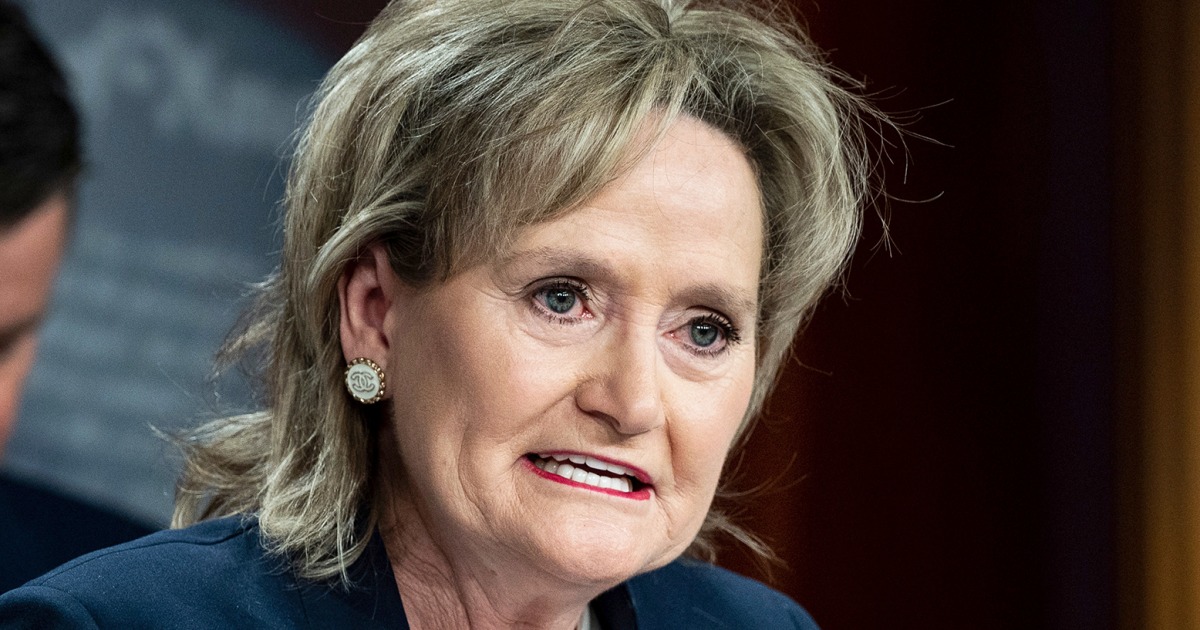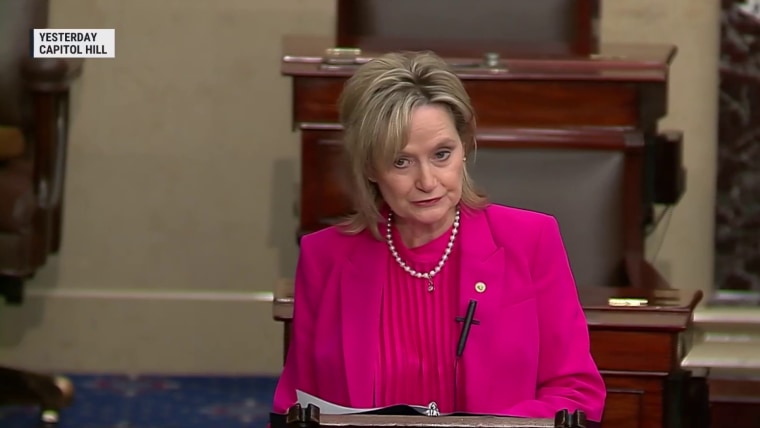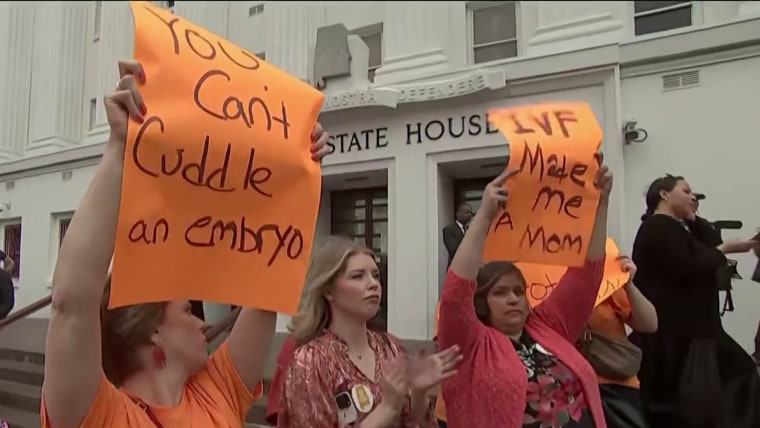How 'fetal personhood' in Alabama's IVF ruling evolved from fringe to mainstream
MARCH 14, 20245:01 AM ET
Odette Yousef
LISTEN· 3:34
3-Minute Listen
PLAYLIST

Alabama's state capitol in Montgomery, Ala. earlier this year
Andi Rice/Bloomberg via Getty Images
The Alabama Supreme Court's decision that frozen embryos have the same rights as children came as a surprise even to many who oppose abortion rights. But for researchers and activists who have long tracked narratives at the most extreme end of the anti-abortion movement, this legal determination was inevitable.
They say it shows how, even as the pro-abortion rights movement focuses on preserving legal access to abortion and contraception, other laws that codify the once-fringe notion of "legal personhood" may more immediately underpin decisions that could drastically curtail reproductive rights.
"The movement that's referred to as 'personhood,' to indicate that life begins at conception, was always going here," said Alex DiBranco, executive director and co-founder of the Institute for Research on Male Supremacism.
DiBranco said that while IVF may be popular among Americans on both sides of the political spectrum, hardline conservative organizations like the Heritage Foundation and Live Action have long villainized the IVF industry. Often referring to it as the "big fertility" industrial complex, they characterize the sector as predatory and profit-driven.
"They talk a lot about the idea that it's eugenics, that it's really more about designer babies than actually supporting women or other people who have fertility needs," DiBranco said.
At its most extreme, reproductive rights researchers and advocates warn that states where fetal personhood is established could even see courts citing those laws in criminal cases where pregnant people are concerned. They say the door to this application was opened decades ago when the American public succumbed to widespread hysteria over so-called "crack babies."
A moral panic normalizes a fringe idea
In 1973, when the Supreme Court issued its decision on
Roe v. Wade, the notion that fetuses or embryos were full rights-bearing humans under the law was not widely popular.
"Immediately in the days after that decision, there were proposals to codify some form of fetal personhood," said Dana Sussman, deputy executive director at Pregnancy Justice, an organization that provides legal defense services to pregnant people in civil and criminal cases. "It did not gain traction until ... the late 80s and early 90s. And that was when the war on drugs was on a collision course with the war on abortion."
Sussman and others say that it was the moral panic over so-called "crack babies" that took the idea of fetal personhood from fringe to mainstream. At the time, there were widespread fears that prenatal use of crack cocaine could lead to children who might grow to have a number of problems. The narrative contained classic moral panic tropes: children in utero as helpless victim; and a scapegoat that garnered little sympathy within the American public at the time, namely poor, African-American women who used drugs.
Several states passed laws that allowed women to be charged with criminal child abuse for exposing their fetuses to illicit substances during pregnancy. These resulted in hundreds of women being jailed in connection with their pregnancies. Just as significantly, the laws also entrenched the concept of fetal personhood into state criminal codes.
"It was a political opportunity for the anti-abortion movement, through the fears of and the hysteria surrounding the 'crack baby' epidemic," said Sussman.
In the years since then, studies show that children born to mothers who used crack cocaine while pregnant carry
no significant difference in their life outcomes when compared with other children. Nonetheless, the exploitation of the fear at the time was potent. It opened the door to charging women with crimes against their own pregnancies. It also shifted popular opinion on the concept of fetal personhood. A
2022 survey by the Pew Research Center found that 56% of Americans believe that "human life begins at conception, so a fetus is a person with rights."
A wave of fetal personhood bills
In Alabama, Sussman said the path toward the IVF decision had been cleared at least a decade earlier. In 2013, the state's Supreme Court
ruled that fetuses are considered children in criminal cases concerning prenatal exposure to controlled substances.
"So this has been the creep, and it started primarily in criminal law," said Sussman. "And it has extended to the law that was at issue in the Alabama Supreme Court [on frozen embryos] ... which is a civil law that now impacts IVF and fetal personhood."
Those who have followed these developments closely say this cascade of small shifts has been tragic to watch.
"I wish we cared when it was impoverished women who were being locked up," said Grace Howard, associate professor of Justice Studies at San Jose State University.
"I'm glad that people are outraged about [the IVF ruling]. They should be outraged about this," she said. "But damn, if they had been this pissed off a decade ago, I don't think that we would be where we are right now because it would have stopped this creep from happening."
According to Pregnancy Justice, at least 11 states currently have laws broadly defining fetal personhood. In those states, these definitions could interplay broadly with civil and criminal codes. But it notes that all states have case law or statutes that, in some area, designate fetuses as a "person," "minor" or "child."
"There are personhood laws that exist in multiple states around the country that are not being effectuated to their full extent," said Sussman. "The concern that we have here is that, whether it's prosecutors [or] whether it's litigants, will start to use those laws to criminalize self managing abortion, criminalize pregnancy loss, criminalize behavior during pregnancy, go after IVF in the way that we saw in this civil case or criminally, too. ... And so that is sort of the sleeping threat that lingers in a lot of these states."
According to the Center for Reproductive Rights, 13 states currently have personhood bills under consideration, from Alaska to Illinois to Massachusetts. While much of the concern currently centers on how these may be used in relation to IVF services, Howard warns that the ramifications could extend far beyond, to the people who are, themselves, pregnant.
"The way I see it, once any element of this is criminalized or once the fetus is defined as a person in any area of law, criminalization is the next step and it is not hard to do," she said.

 The wound is open. Republican Men are clueless about IVF. Most know about Abortion, as that's easy. IVF still applies to Woman's Reproduction and now they have no idea to spin, "All Babies are Living Things" with it.
The wound is open. Republican Men are clueless about IVF. Most know about Abortion, as that's easy. IVF still applies to Woman's Reproduction and now they have no idea to spin, "All Babies are Living Things" with it.The wound is open. Republican Men are clueless about IVF. Most know about Abortion, as that's easy. IVF still applies to Woman's Reproduction and now they have no idea to spin, "All Babies are Living Things" with it.







www.nbcnews.com






